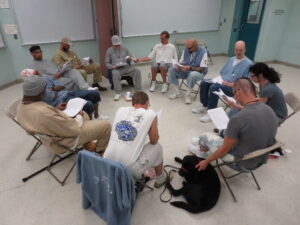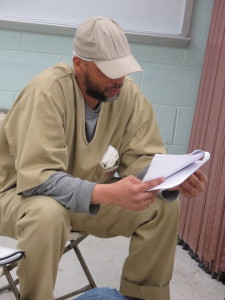Drew Leder reflects on the history of the work currently known as the JCI Scholars Program:
Reading backwards in time, the JCI (Jessup Correctional Institution) Scholars Program can be seen as having begun July 13, 2009. I was responding to a request from Glennor Shirley, then the excellent head librarian for the Maryland prison system. She was seeking teachers to lead book discussion groups, and when I expressed interest, she put me in touch of two of the best and most receptive librarians, one of them being Grace Schroeder who continues to run the JCI program. Her name is appropriate – she has been a gracious host, as has Vincent Greco her tireless clerk who helps administer classes. For a maximum-security setting, the upper administration has been unusually supportive of our work. Without their endorsement nothing flies. And primary credit surely goes to the committed cohort of incarcerated men who have anchored the program for years. “When the student is ready, the teacher will appear.” We have been blessed with many wonderful students. Or maybe we outsiders are the students, and the incarcerated men our teachers.
Or both.
 Since 2009 I have taught two or three small courses a year (e.g. 6-8 sessions) focused on books that have often straddled the border of philosophy, psychology, and spirituality. My aim has been to provide material that would be challenging yet accessible. I sought empowering, nurturing, even joy-producing books for individuals caught in a harsh and coercive system. Our readings have ranged from ancient Eastern and Western texts (Epictetus’s Enchiridion (Handbook), the Tao te Ching) to more modern works (The Power of Now, Awakening the Heroes Within, Awakening Joy, etc.) I have always particularly appreciated working with “long-timers” and “lifers” – they have had a lot of time to reflect, and often have a depth of engagement with the material, self, and world, that makes for bracing discussion.
Since 2009 I have taught two or three small courses a year (e.g. 6-8 sessions) focused on books that have often straddled the border of philosophy, psychology, and spirituality. My aim has been to provide material that would be challenging yet accessible. I sought empowering, nurturing, even joy-producing books for individuals caught in a harsh and coercive system. Our readings have ranged from ancient Eastern and Western texts (Epictetus’s Enchiridion (Handbook), the Tao te Ching) to more modern works (The Power of Now, Awakening the Heroes Within, Awakening Joy, etc.) I have always particularly appreciated working with “long-timers” and “lifers” – they have had a lot of time to reflect, and often have a depth of engagement with the material, self, and world, that makes for bracing discussion.
Over time we have reached out to authors we have read, having impact in the larger world. The inmates’ words were incorporated into the introduction of the new edition of the Buddhist-inflected Awakening Joy. The author recently travelled to the east coast and made a special request to come to JCI and address the men.
The incarcerated men’s words have reached beyond JCI’s walls in other ways as well. They were read aloud at the inauguration of the President of the (Jungian) Pacifica Graduate Institute. The article I co-wrote with my students, “The Enlightened Prison,” was accepted for publication in the Studies in Law, Politics, and Society. I believe that writing with, about, and for prisoners is an ongoing element of our JCI Scholars Program.
But teaching is at its heart, and we have struggled to create and expand opportunities in a maximum security setting. Around 2010 I started bringing Loyola University service-learning students with me to help facilitate the class, but mostly to be co-learners with the men in the prison. This has been a big “win-win” – the incarcerated men have loved the fresh energy of the college kids, and those “kids” have been transformed by their experience, very impressed by the intellect and heart of the men. All stereotypes lie on the ground exploded. I suspect the Loyola students have learned more at JCI about the excitement of higher education than they had on their own privileged campus.
But how to reach more JCIers? There has long been a waiting list of men trying to get in college-level classes. Again, “when the student is ready, the teacher will appear.” With a gracious spirit, teachers have started to appear, drawn from area colleges, and their own  inner leadings, to participate in this unique experience. Gradually, the occasional course has been turning into a “program” without our even realizing it.
inner leadings, to participate in this unique experience. Gradually, the occasional course has been turning into a “program” without our even realizing it.
Jim Schelberg, an undergraduate at Washington College, newly back from a military tour in Afghanistan, felt inspired to organize an ethics course taught by Washington College faculty. It became the subject of a Washington Post article, “College student’s philosophy program brings Plato and Buddha to a Md. Prison.”
Tim Brown, S.J., priest, professor and special assistant to the President of Loyola, started teaching classes on business law.
And so it has gone – volunteer professors such as Josh Miller, Mikita Brottman, Daniel Levine, Daniel Brunson, Giuseppina Iacono Lobo, Joseph Hall, and others, adding courses on Philosophy, Literature, Writing, Political History, etc. (Dan Levine and Josh Miller have taken the lead on building this website.) Now, not only can all interested and qualified JCI’ers (and we’re over 100) get into a class – they can take multiple classes. While we have never found a good way to provide college credit for the work being done – the bureaucratic and financial obstacles have been profound – we are delighted to share in the transformation of prison into a house of higher learning for prisoners and “outsiders” alike.
In finishing this, a quick reflection on my own starting-point. In 1992, inspired by fellow philosopher, Glenn Mazis, who had done prison teaching, and my own inner leadings from a spiritual retreat, I called the information line for the Maryland Penitentiary. Located in downtown Baltimore, it was then the maximum security prison for the state of Maryland. With surprising swiftness I found myself in a classroom teaching ancient philosophical texts, Western and Eastern, and then modern Continental theorists, such as Heidegger, Buber, and Foucault. The latter discussions proved so interesting we started taping them, and they formed the heart of a book, The Soul Knows No Bars: Inmates Reflect on Life, Death, and Hope.
We started a “Bridge Project” at Loyola designed to bridge college campuses and prisons for mutual education. In addition to sponsoring classes, we held book drives for the prison library; hosted speakers on criminal justice issues; sponsored a powerful memoir by Arlando Jones III, Eager Street: Life on the Corner and Behind Bars. We also publish and have helped distribute thousands of copies of a brochure on the “Power of Meditation.”
When I began in 1992 I thought I would teach a six-week course. In and out. Over 20 years later I realize I’ve become a “long-timer,” maybe a “lifer” involved in this work. I guess “when the student is ready, and remains ready, it’s hard for the teacher to leave.”